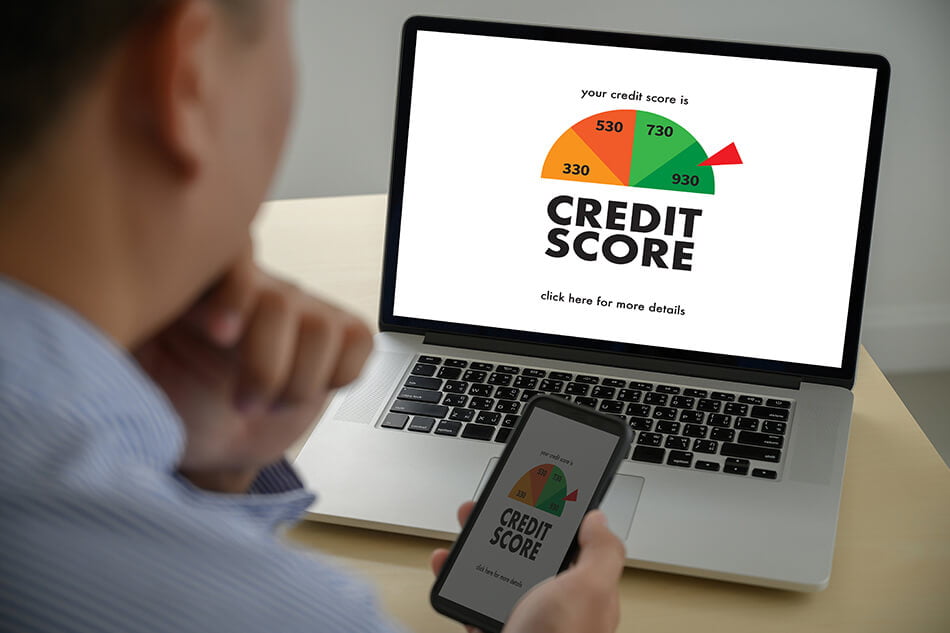- Key Takeaways:
- What is a credit score?
- Who rates my credit score?
- What is a good credit score?
- Why do credit reporting agencies give different credit scores?
- Differences in lenders
- Which credit reporting agency should I use?
- What is a bad credit score?
- Do I have a good credit score?
- What is a good credit score for my age?
- What affects my credit score?
- Can I improve my credit score?
- Can I improve my credit score?
- How can I view my credit score?
- How can I view my credit score?
- FAQs
Did you know that a high credit score can save you tens of thousands of dollars? Lenders love a borrower with an excellent credit score! The best interest rates and lending terms will be at your fingertips, saving you so much money over the loan duration.
What is a credit score?
A credit score is 0 to 1,200, which illustrates how reliable you are when repaying debt. The higher your credit score, the more creditworthy you are! Lenders will see a snapshot of your history as a borrower, assessing if repayments are consistently paid on time.
Every time you have secured credit from a lender or paid a bill, your activity has been recorded. Each activity then affects your credit score, either positively or negatively. But, what is a good credit score?
Lenders will view high credit scores as an indicator that you are a good borrower and will pay back any debt. A low credit score signals to the lender that you are a risk and may not grant you any finance.
Your credit report will factor your success rate when you want to apply for a home loan. A good credit report will attract low-interest rates and a high chance of approval.
Unfortunately, a low credit score may result in a home loan rejection. A professional broker may be able to find you an alternative home loan, but you may risk higher interest rates.
Who rates my credit score?
Australia has three major credit bureaus that take care of credit reports: Equifax, Illion, and Experian. Your lender will report back to one or more of these agencies at the end of every month. The agency will use algorithms to assess your borrowing activity when calculating credit scores.
Each credit reporting organisation handles information slightly differently, with some scoring credit up to 1,200 points. They have their own credit scoring models.
You can register with one of these bureaus to obtain a free credit score. You may find that each of these credit-reporting agencies provides you with a slightly different credit score. However, any possible differences in your credit score will not be too significant.
What is a good credit score?
A good credit score is usually above 660 if Equifax or Experian is used. Illion rates a credit score of 500 to be good, however.
If you have always paid your bills on time and never defaulted, your credit score should be reasonably high.
The only way to negatively affect your credit report and score is to miss payments and handle your finances irresponsibly.
Experian
When using Experian, a good credit score is rated between 625 to 699. A very good score is judged to be 700 to 799, whilst an excellent score is above 800 points.
A fair credit score for an Experian credit report is stated as being between 550 and 624. Below a credit score of 550 is considered to be below average.
Take a look at the Experian credit score table below
| Fair | Good | Very Good | Excellent |
|---|---|---|---|
| 550-624 | 625-699 | 700-799 | 800-1,000 |
Illion
What can you expect to find if you decide to use an Illion credit report? A good credit score, according to Illion, is rated from 500 – 699, with a great score reaching between 700 – 799. If you achieve a rating of 800 – 1,000, your credit score is judged to be excellent.
Illion determines that a credit score from 300 – 499 leaves room for improvement, with low scores rated below 300.
Take a look at the Illion credit score table below
| Room for improvement | Good | Great | Excellent |
|---|---|---|---|
| 300-499 | 500-699 | 700-799 | 800-1,000 |
Equifax
An Equifax credit score can reach the dizzy heights of 1,200! An excellent credit score is rated between 853 and 1,200, whilst a very good score is judged from 735 to 852.
A good credit score from Equifax is achieved from 661 to 734, with an average score between 460 and 660. Under 460 is rated as a below-average score.
Take a look at the Equifax credit score table below:
| Average | Good | Very Good | Excellent |
|---|---|---|---|
| 460-600 | 661-764 | 765-852 | 853-1,000 |
Why do credit reporting agencies give different credit scores?
Credit reporting agencies give different credit scores because they use different scales when assessing credit activity. These agencies also used different algorithms which can impact the overall score given.
What does each credit reporting agency consider when calculating your credit score?
They take into account
- How many credit accounts do you own
- Your repayment history
- The number of credit applications in the past 5 years
- Credit infringements
- Any court judgements
- Bankruptcies
Whilst credit reporting agencies all see the same information, they actually weigh the relevance of the information differently.
For example, one credit reference agency may give more prevalence to the number of credit applications you have applied for. A different credit reference agency may give more weight to the number of credit accounts you actually have.
Differences in lenders
It is also interesting to note that not all lenders report activity to all credit reporting companies. A lender will report your activity to a credit reference agency at the end of each month.
They will inform them of positive or negative actions, such as paying or not paying your credit repayments.
For example, your credit card company may only report your credit activity to Experian. Experian will use up to date information to determine accurate credit scores.
As the credit card activity does not reach Illion or Equifax, the positive or negative action is omitted from their calculations.
Which credit reporting agency should I use?
Your lender will choose which credit reporting agency they will use when checking your credit report. You have no control over this as different lenders will trust and prefer a certain credit bureau.
For a greater level of credit score awareness, you can check your credit score yourself. Log into Equifax, Illion, and Experian and see what credit score each agency has rated you at!
You can then make necessary improvements to your credit score and check that all information stored is accurate.
If you subsequently apply for credit, you will not be able to judge which agency your credit provider will look at. You might think you have a good credit rating with Illion, but your potential lender may view an average rating with Equifax.
Being aware of all three credit scores arms you with sufficient information to make your credit scores work positively for you.
What is a bad credit score?
When using Experian, a bad credit score is usually under the 500 mark, or under 549. Illion, Equifax, and Experian will judge a bad credit score at different rates.
- Illion judges a score of 300 to 499 as having room for improvement, with a low score rated as 1 – 299.
- Equifax determines a bad credit score to reach 459 points and below.
- Experian rates a below-average credit score at 0 to 549.
Do I have a good credit score?
Check your credit score today to see whether you have a good credit score! If you have passed the 600 credit score mark, you are on track to achieving a good credit rating! When using Illion, you may achieve a good credit rating when reaching only 500 points.
When using Illion, Experian, and Equifax, your credit rating will be clear to see on screen. Remember to check all relevant credit bureaus to assess the different credit scores rated against varying boundaries.
What is a good credit score for my age?
A good credit score for your age considers your life experience, with higher credit scores expected for older people. For example, if you are in your 40s, you should expect to have reached a credit rating of around 700.
As you age, your credit history will become more extensive. You may have additional credit by the time you are in your 40s, in contrast to your younger self. But, what is a good credit score for your age?
The older you are, the greater your chances of proving you are a reliable and responsible borrower. The recommended credit scores expected at various age ranges will offer different expectations.
There are also some slight differences in credit scores for females and males.
On average, the typical credit score of an Australian is 695.6. This credit score provides a ‘good’ rating at the high end of the scale with both Illion and Experian.
However, this credit score calculated under Equifax reveals a mid-range ‘good’ credit score.
Take a look at the following recommended credit score ranges according to age and gender
| Age range | Male | Female |
|---|---|---|
| Aged under 21 | 743.2 | 742.3 |
| 20s | 675.7 | 671.7 |
| 30s | 684.8 | 679.4 |
| 40s | 700.6 | 698.8 |
| 50s | 735.1 | 736.9 |
| Over 60 | 788.3 | 787.9 |
What affects my credit score?
Every positive and negative act between you and your lenders is recorded and affects your credit report and score. The amount of credit you have and the number of credit applications applied for also impact your rating.
One of the main factors affecting your credit score is your repayment history. Have you paid your home loan and credit card repayments and bills on time? If you have defaulted on any repayments or credit accounts, those actions will be recorded and affect your credit score.
Court judgements and bankruptcy will impact your credit report significantly. It may be challenging to improve your rating for quite a while, although it is possible with positive credit activity over time. Your credit history is with you for a long time so think carefully before defaulting!
The number of times you have applied for credit will also affect your credit report. A responsible borrower will give considerable thought before applying for credit. Frivolously applying for any type of credit signals to a lender that you may not be very responsible.
Can I improve my credit score?
If you are disappointed with your credit score, all is not lost! You CAN improve your credit score. It may take time, but it is a very real possibility.
Can I improve my credit score?
A credit rating changes every month when lenders report back to credit reference agencies. Making regular changes to your credit activity and repayment actions can really improve your score.
- Pay all of your bills on time, as even one day late is classed as a default.
- Set up direct debits for bills, so you never forget to pay them.
- If you have credit cards, lower the limits available on them.
- This reduces the temptation to use your credit card!
- Never apply for credit frivolously – ask a mortgage broker for advice instead!
- Read updated credit reports from all agencies regularly.
- Check that errors have not been made to your credit score.
You can also seek the help of a credit repair expert. One of our favourite podcasts for first home buyers featured one in this episode. Listen to learn more about how to improve your credit score.
How can I view my credit score?
View your current credit rating when logging into a credit bureau website or app. You can see your free credit score instantly! Viewing your own credit rating and lender history can help you make real improvements.
Your consumer credit reports will hold information about credit card companies and any personal loan history.
It is important to check that all credit report information is accurate. Inaccurate credit reports and credit history will negatively affect your credit scores.
If you identify any incorrect information, contact the credit bureau immediately. They must provide precise credit details and so must rectify any inaccuracies.
How can I view my credit score?
Do you want to apply for a first home loan or refinance but have a poor credit report score? Contact Lendstreet’s expert brokers for professional advice regarding the credit products available to you.
Lendstreet will find the perfect credit option for you, whatever your personal circumstances, so contact the experts today!
FAQs
Will missing a credit card repayment affect my credit score?
Unfortunately, missing a credit card repayment will affect your credit score. Your lender will record the activity and report to a credit reference bureau.
Regardless of the length of time since your repayment was due, the impact on your credit health will be the same. You may also incur arrears fees.
Can I improve my credit score?
Yes, you can improve your credit score! Credit scores move fluidly regularly and can be improved. Making regular adjustments such as never missing a repayment will help increase your score in no time.
Remember that defaults will still stay on your recent credit report history, although plenty of positive actions will soon increase your score.
How long do you have to wait for your credit score to go up?
Your credit score could go up after just 30 days! Lenders usually report activity to credit bureaus at the end of every month. Seeing a credit score increase after such a short period is a real possibility.
Any improvement may be marginal, however, with just a few credit points increase. Although, continuous positive actions on your behalf will soon make a considerable difference.
What if I have no credit history?
If you have not yet applied for any credit, you have a fresh chance to build great credit! Your credit score will begin at around the 300 mark, not at zero, as some individuals may assume.
Applying for credit is not a bad decision. Providing the credit limit is low, such as a few hundred dollars, and as long as you pay repayments on time. Securing a small amount of credit allows you to prove to lenders that you are responsible.
Do I need a good credit score to buy a house?
You don’t need a good credit score to buy a house! Visiting a professional mortgage broker will enable you to envisage a series of possible home loan options. They could have choices for you, even if your credit report still needs improvement!
Having a good credit score will make the home loan application process easier. You will also be able to apply for lower interest rates and favourable terms.
However, a low credit score does not mean that all lenders will refuse your application. Although, you may have to consider higher interest rates or a larger deposit to ensure that your home loan application is successful.
Contact your expert Lendstreet broker today to discuss a range of possible options.
Related articles
If you're living in Australia and currently deciding whether to take out a home loan, it's essential to understand ...
Did you know that it is often cheaper to build a house on vacant land, rather than buy established properties? ...
Did you know that over 67% of Australians own their own home? That is over 5.4 million homeowners across the ...









